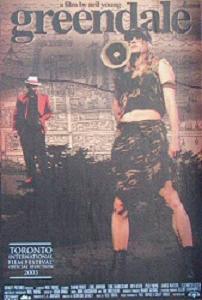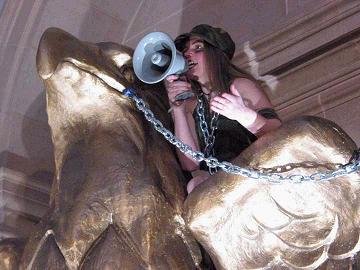Greendale


Greendale is not quite a movie. It is more of an extended music video, one that just happens to last about the length of a film and gee, it has all the songs from the album of the same name by Neil Young and Crazy Horse. Greendale is a small town meant to signify a sense of Americana and its growing sense of loss. The songs form an interconnected story about a family in Greendale and its struggles. Young is the driving force behind the film, directing as Bernard Shakey and editing as Toshi Onuki. The songs serve as the script, and the actors lip sync to the lyrics. It was shot on grainy video, giving everything a sort of hypnotic effect. The film is not as meaningful as Young probably wished for, partially because there is no dialogue.
Young is a little too literal with his lyrics. Song and film are very different genres, and success in both is not the same. In writing songs, it is good to be descriptive and poetic. Film is a visual medium, where somebody can express thoughts and ideas through both dialogue and actions. Young limits himself to only using his song lyrics, which sometimes makes things extremely repetitive. When he sings "the hero and the artist compared goals and visions" in "Falling From Above," he shows a fireman and a guy with a beret (probably the artist) sitting in a bar moving their hands. It is unintentionally funny. Luckily, most of the time things do not come off like this. Watching everybody speak with Young's voice is a little weird at first, but it's fine by the middle of the first song.
The main event that seems to drive the mini stories is the shooting of an officer by Jed Green (Eric Johnson). It has a profound effect on Grandpa (Ben Keith) and Grandma Green (Elizabeth Keith), and indirectly prompts Sun Green (Sarah White) into a life of social activism. Grandpa longs for a time when things were simpler, the media less intrusive, and when people were nicer. Sun's character is probably the most compelling character. She begins the movie by creating an anti-war message with hay on a mountainside, and later leaves Greendale to be an environmental activist. Greendale ends with its best song, "Be the Rain," a call to activism and conservation. Another stand out is "Bandit," a slow, melancholy meditation that provides the most emotional moments in the film.
This will probably appeal most to fans of Young, who can see him express another outlet of his creativity. The music isn't as amped up as Young and Crazy Horse can get, and Young veers between whispering and yelling his lyrics. Most of the songs focus on telling mini-stories, so one needs to spend the time to pay attention to what is sung on screen. The strangest sequence has Johnson dressed as a devil, strutting around through town. Still, because the lyrics tend to focus on moving a story forward, there is less time for political rhetoric, watering down anything that Young hoped to express.